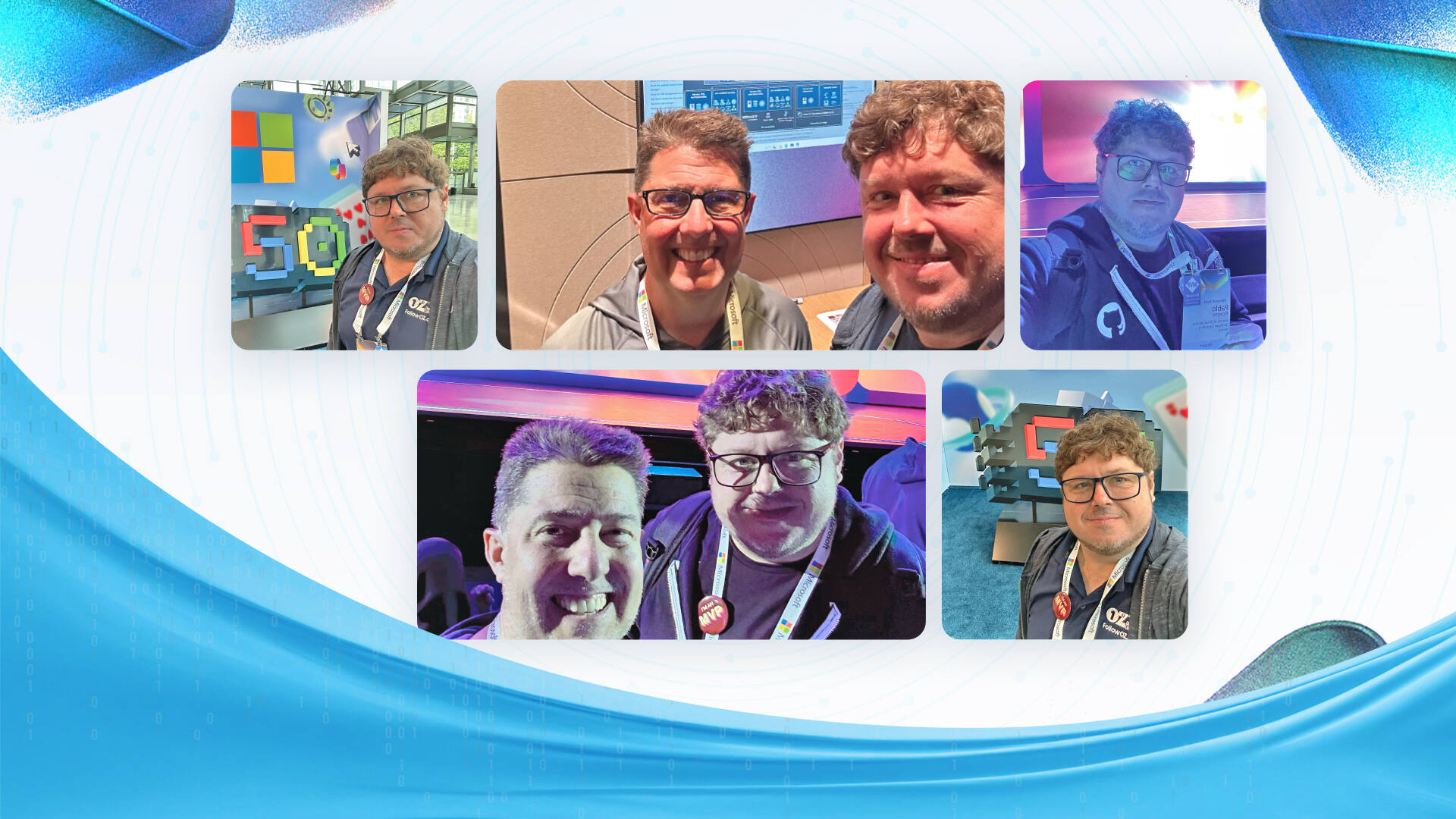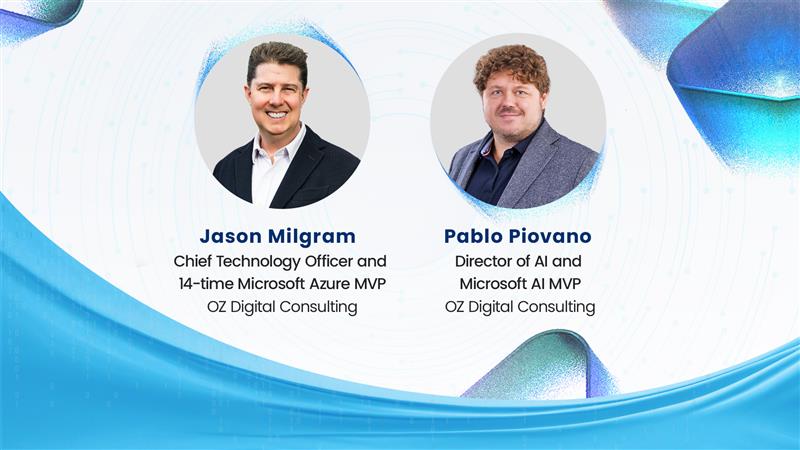The curtains close on yet another inspiring Microsoft Build conference. Once again, the energy, innovation, and camaraderie did not disappoint. Our MVPs, Jason Milgram, Chief Technology Officer, and Pablo Piovano, Director of AI, represented OZ Digital Consulting this year; Jason as the “Expert in Cloud Platform” in the Expert Meetup Program and Pablo Piovano as a proctor for LAB324: “Interacting with multimodal models and agents in Azure AI Foundry.”
The Best Bits of Microsoft Build
Microsoft Build 2025 kicked off with an opening keynote by Microsoft Chairman and Chief Executive Officer Satya Nadella. With thousands of attendees and hundreds of sessions, Build reaffirmed Microsoft’s commitment to supporting developers with cutting-edge technology and innovation. The big focus this year? No big surprise: All things AI and, specifically, agents, were at the top of the announcement list.
There are so many highlights—far too many to list here—but one key moment was the Expert Meetup Program. According to Jason, it “created an amazing space for one-on-one conversations where attendees could deep-dive into technical questions, explore real-world use cases, and get hands-on guidance to overcome challenges.”
“Whether it was enhancing solution knowledge, breaking through roadblocks, or brainstorming around Microsoft’s latest announcements,” he adds, “each conversation was meaningful and energizing.”
There were big announcements, from major updates to Azure AI Foundry and Copilot Studio to deeper integrations across Windows and Power Platform.
In no particular order, here are our top 10 takeaways from Build 2025:
1. Multi-agent is here
Organizations will soon be able to build multi-agent systems in Copilot Studio, where agents delegate tasks to one another. These agents can be built with the Microsoft 365 Agent Builder, Azure AI Agents Service, and Azure Fabric. Use cases could include a campaign manager agent that invokes the channel agent (social, email, etc.) for journey design and content development
2. NLWeb will turn websites into agentic apps
Calling all website owners, the Natural Language Web (NLWeb) is similar to the HTML protocol, but for the agentic web. It simplifies the natural language interface for websites. Microsoft says NLWeb was conceived and developed by R.V. Guha—former Google Tech Fellow and creator of RSS, RDF, and Schema.org—who recently became a Microsoft CVP and Tech Fellow.
3. GitHub Copilot moves from pair programmer to peer programmer
GitHub Coding Agent (“Project Padawan”) is now generally available to all Copilot Enterprise and Copilot Pro+ customers. Ideal for low-to-medium complexity tasks in well-tested codebases, the agent can handle things like adding features and fixing bugs to extending tests, refactoring code, and improving documentation.
4. Copilot Studio gets more pro dev-friendly
Microsoft is positioning Copilot Studio, its low-code/no-code development platform, as a tool for professional developers who need more powerful tools to build more complex agents. Microsoft is working on exposing a set of M365 Copilot APIs for developers (So far, only the retrieval API is available in preview.). Microsoft is adding more pro-level features to Copilot Studio, including API access (retrieval API now in preview), Bring Your Own Models from Azure Foundry, and Copilot Tuning that allows organizations to tailor M365 Copilot behaviors using business-specific content like brand guidelines, product data, and internal documentation (Currently available in preview for select use cases.).
5. The MCP protocol is key to building agents
Microsoft has joined the Model Context Protocol (MCP) Steering Committee and is integrating MCP support across GitHub, Copilot Studio, Dynamics 365, Azure, Azure AI Foundry, Semantic Kernel, Foundry Agents, and Windows 11. “Think of MCP as a universal USB-C connector for AI,” linking apps, agents and tooling in a standardized way.
6. The Windows 11 Copilot Runtime is now “Windows AI Foundry”
AI Foundry is now Microsoft’s brand for Azure AI Foundry built for model selection, optimizing, fine-tuning and deployment across client and cloud. Microsoft has previewed local AI Foundry support extending beyond Windows, including Mac, with general availability timelines evolving. Azure AI Foundry is the one-stop shop for every professional developer to be able to get the tools that they need to bring AI into their apps. Foundry will help unleash a new age of agentic and AI-driven automation.
7. Microsoft is open-sourcing the Windows Subsystem for Linux (WSL)
Microsoft is open-sourcing most of WSL, following the release of the Mariner Linux base and the WSL-g UI layer. Also on the horizon: open-sourcing the GitHub Copilot Chat Extension for VS Code.
8. Microsoft is expanding Entra, Defender for Cloud, and Purview
By embedding them directly into Azure AI Foundry and Copilot Studio to help organizations secure AI apps and agents across the entire development lifecycle. The new Entra Agent ID —now in preview—is meant to manage agent identities across Microsoft and third-party platforms such as ServiceNow and Workday.
9. SQL Server 2025 is now in public preview
Built-in vector search and the integration of AI directly into the database engine “enables more intelligent search.”
10. Image generation now powered by GPT-4o
New Create experiences powered by GPT-4o enable developers to generate visuals and multimodal content directly from natural language prompts
To learn more about the announcements at Microsoft Build 2025, check out the official Microsoft Build Book of News.
Over the course of three action-packed days, one core theme emerged. And that’s Microsoft’s focus on developers and the development experience. This year’s Build reinforced that commitment, showing how even as technology hurtles toward an AI-driven future, Microsoft remains dedicated to helping developers become more productive and successful. Whether that’s through .NET Aspire’s streamlined approach to complex systems or the thoughtful integration of AI agents into development workflows, empowering developers remains at the heart of Microsoft’s strategy.
Our MVPs, Jason and Pablo, are bringing these insights back to our teams and clients, and are already translating these ideas into forward-thinking solutions that are shaping the future of software development.
Want to accelerate your AI journey? Contact us today.





